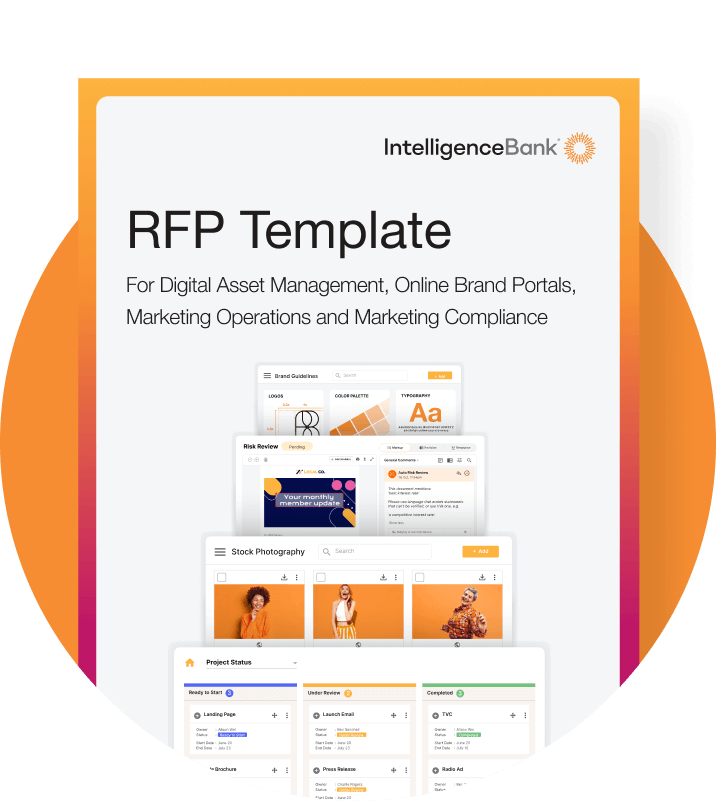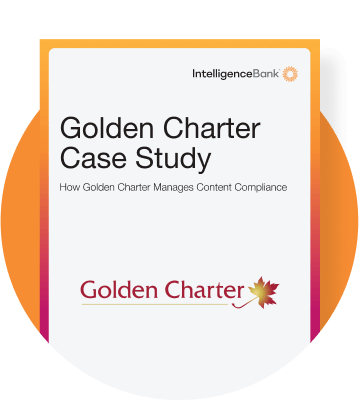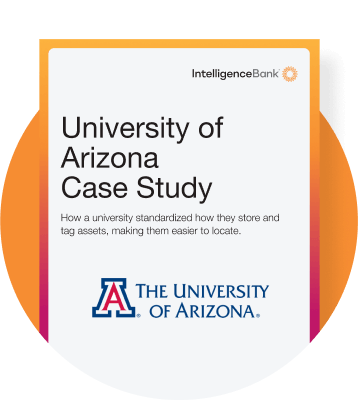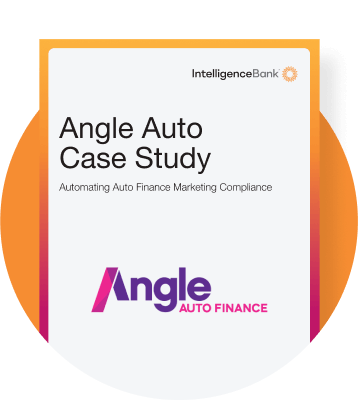Whether you’re new to Marketing Compliance and the tech surrounding it, or currently preparing a business case, this guide will walk you through:
- The Current State of Marketing Compliance
- Marketing Compliance essentials
- The sector’s best practice solutions
- How to calculate ROI value
- Who benefits from Marketing Compliance
The Current State of Marketing Compliance
Signing off on every marketing message for legal compliance is causing headaches for Marketing Compliance teams. Right now, they are bearing the brunt of a perfect storm of demands that even the most plugged- in Compliance teams are finding hard to manage.
There are a couple of reasons for this. Firstly, their colleagues in Marketing are producing content at a pace the industry has never seen. The sprawl of communication channels, generative AI and competition for market share has created a punishing schedule of review requests.
Secondly, in the face of increased requests, Compliance teams are dealing with their own challenges. Government and industry regulations are evolving rapidly, scrutiny is increasing, resources are tight, and then of course, they have the risk of horrendously costly penalties for any missteps.
As many Compliance professionals are aware, there are software solutions specifically built to assist the review process – the issue is getting budget – and that means proving Return on Investment (ROI) to buying committees.
Why Marketing Compliance is Essential
Marketing compliance ensures that a brand’s promotional activities align with compliance and legal standards, protecting consumers and maintaining brand integrity. For organizations, this means:
- Avoiding Legal Penalties: Non-compliance can result in hefty fines and legal actions.
- Maintaining Consumer Trust: Transparent and lawful marketing practices build and preserve customer confidence.
- Safeguarding Brand Reputation: Compliance demonstrates corporate responsibility, enhancing brand image.
- Improving Operational Efficiency: Streamlined compliance processes reduce the risk of last-minute campaign adjustments or forced takedowns, ensuring smoother marketing execution.
Embedding compliance into marketing processes is a way for businesses to help tame the unpredictability that can occur when finite resources and changing regulations collide with marketing speed and scale.
What Does Marketing Compliance Software Look Like?
Depending on the size of your business and nature of your industry, there are several solutions that can significantly increase accuracy and decrease the amount of direct human oversight required to approve content.
Platforms like IntelligenceBank provide a suite of integrated solutions designed to work seamlessly together, yet can also be adopted on a needs basis.
Here’s a top-line of the core solutions and typical use case:
Automated Risk Detection
Identifies potential compliance issues in marketing content, including missing disclaimers, visual problems located in content and inappropriate language.
Great for highly regulated industries (finance, healthcare, pharmaceuticals, insurance), large enterprises and distributed marketing teams.
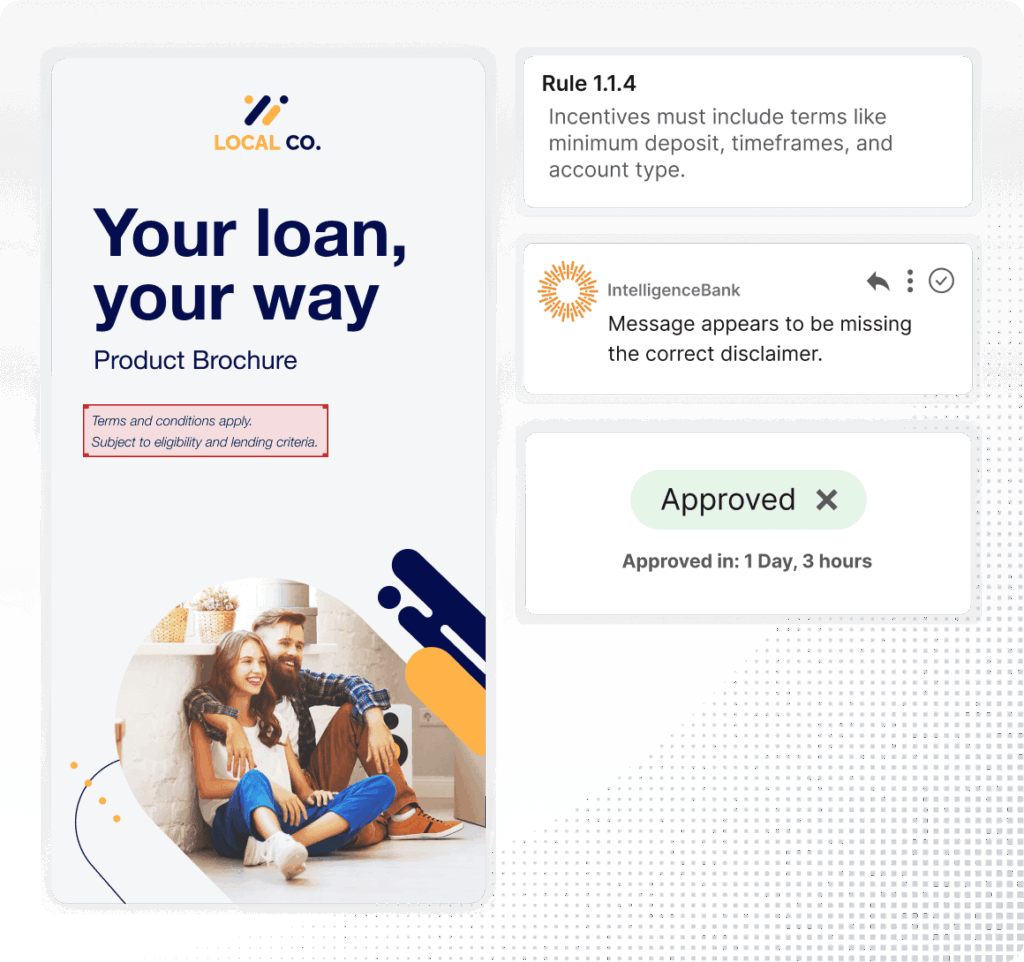
Streamlined Approval Workflows
Facilitates collaboration between marketing, legal, and compliance teams, ensuring timely approvals on creative briefs, and associated content reviews.
Great for mid-to-large businesses with cross-functional teams (marketing, legal, compliance), agencies and brands with outposts (franchisees or global offices).
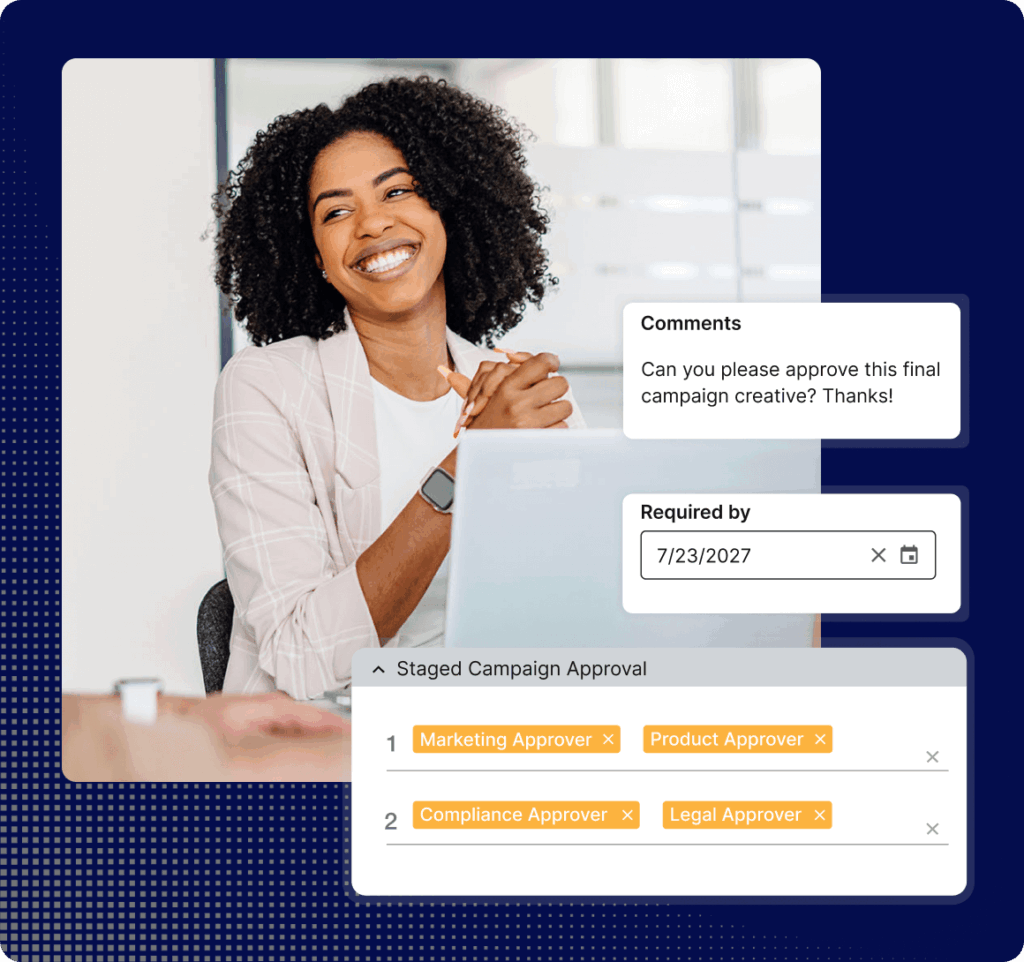
Digital Asset Management
Creates a single source of truth for all approved creative so only final assets are used and distributed across channels. Each asset includes tags and metadata to provide licensing information critical for usage approval.
Suits most organizations with a growing number of digital assets.
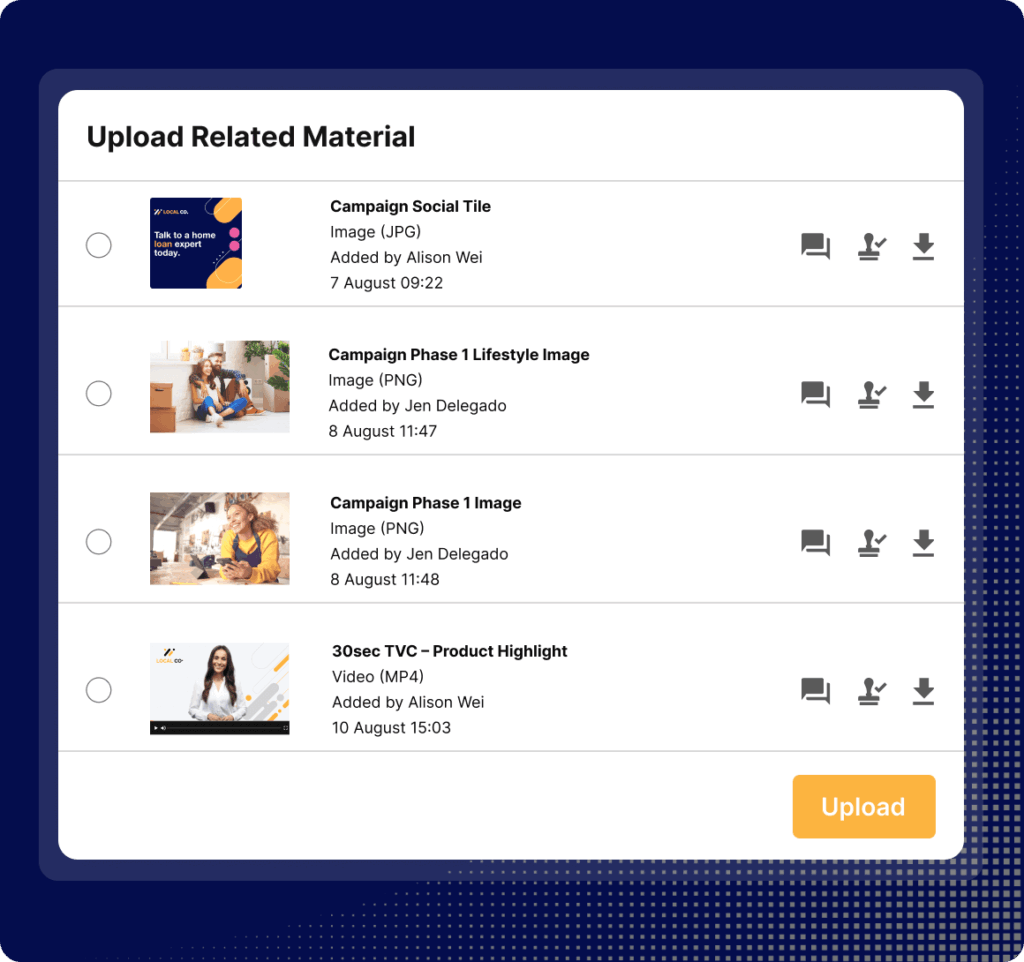
Disclaimer Engine
A tool that makes it easy for people across the business to understand which disclaimers should be used in which ads, across media.
Great for industries with high volumes of content that need to adhere to rules that vary depending on location or media type, (such as gambling, alcohol, finance or travel).
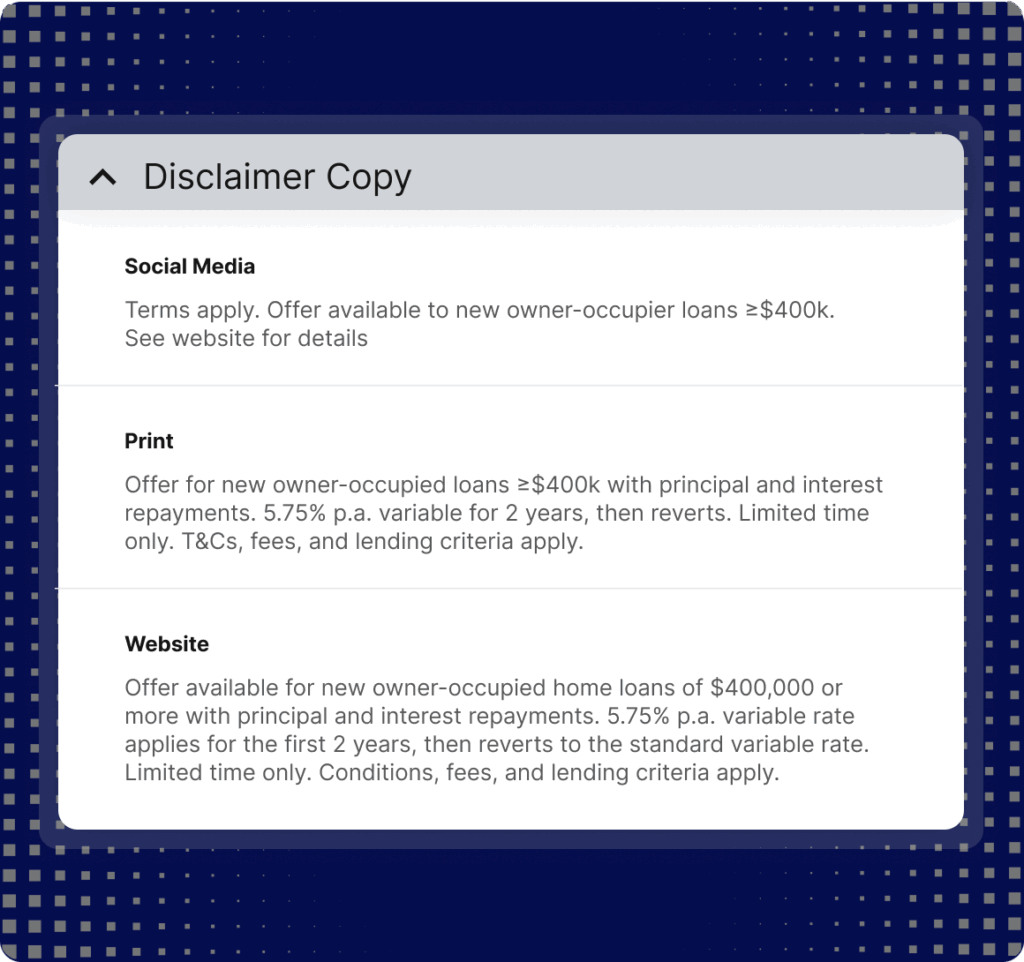
Audit Trails and Detailed Reporting
Maintains records of compliance reviews, and approvals, supporting accountability and transparency.
Great for publicly traded companies, banking and finance, healthcare providers and businesses requiring regulatory proof (FDA, FTC, FINRA).

How to Calculate the Return on Investment (ROI) of Marketing Compliance?
There are two ways to calculate the ROI of marketing compliance:
Time and Materials
For companies reviewing a high volume of content against brand, legal, and regulatory requirements, the ROI is often clear. The more complex the content (e.g., long-form materials with frequent updates and variable compliance rates) and the more approval layers involved, the greater the potential ROI.
Large organizations such as major banks, asset managers, broker-dealers, automotive finance firms, and insurance companies typically see significant benefits. Consistently ‘getting it right’ is challenging, and as content volume grows, scaling a manual legal and compliance review process becomes financially unsustainable.
To calculate the ROI of marketing compliance, IntelligenceBank has created a return on investment calculator to help brands decide if they have the volume of creative collateral that warrants an investment in marketing compliance software.
Key information
These calculators provide an estimate based on key inputs you provide and expected performance improvements. We use industry benchmarks and typical use case scenarios to help you get a general idea of the value our solution could deliver. The figures generated are estimates only and assume a 15% increase in content production per year. Actual cost savings can vary based on a wide range of factors unique to your business and can only be determined after a detailed understanding of your needs and the development of a tailored solution.
Fines
When companies receive fines for marketing compliance breaches, they are often in the hundreds of thousands, if not millions of dollars. The penalties for misleading customers with incorrect information in advertising, using overpromissory language, or by breaching the SPAM act are designed to be a major deterrent. So if a brand has received a fine for $2M from a regulator, an investment into Marketing Compliance Software for $50,000 – $250,000 per annum becomes an easy decision. Such a fine is a red flag telling the company that the processes that seemed to work in the past are no longer fit for purpose and there’s a need to guard against repeat violations.
As well as the quantifiable ROI marketing compliance software can bring, it also safeguards against damage to brand equity. While it’s harder to measure, the repercussions of non-compliance can be severe and long-lasting. Negative headlines, social media backlash, or regulatory scrutiny tarnish a brand’s image, directly impacting customer loyalty and acquisition can take years to rebuild. It can also affect pricing power, talent retention and investor confidence.
Marketing Compliance ROI in Action
There’s nothing like a living breathing Marketing Compliance execution to demonstrate capability and ROI. Here are just a few of our success stories.
Angle Auto Finance – Fast-growing non-bank lender
Angle Auto Finance faced a critical challenge: How to enable 800+ dealerships to customize marketing materials without overwhelming their small compliance team.
By implementing IntelligenceBank’s AI-powered compliance Content and Web Reviews, they automated approvals, reducing manual reviews to just two minutes per asset and scanning 1.6 million pages annually for risks. The solution (which was deployed in 30 days) saved 20,700 work weeks (equivalent to 400 years!). Dealers gained a self-service hub for instant feedback, and Angle Auto now proactively monitors content with AI-driven scans. As Rebecca Henderson, Angle Auto Finance’s Head of Marketing, noted, manual processes would have “blown us up”. With automated compliance, they achieved scale, speed, and regulatory confidence without sacrificing growth. Click here for the full case study.
Tabcorp – One of the world’s largest wagering companies
Tabcorp operates across various Australian states and territories, each with its own complex and ever-changing marketing regulations. Faced with the daunting task of producing over 9,500 compliant assets for high-stakes campaigns like the annual Spring Racing Carnival, Tabcorp turned to IntelligenceBank to revolutionize their workflow and compliance processes. The solution empowered their teams with self-serve templates, allowing non-designers to generate legally approved marketing materials in just 20 minutes – a process that previously took up to 10 days. With 150+ dynamic templates and an AI-powered Disclaimer Engine that automatically applies jurisdiction-specific fine print, Tabcorp eliminated compliance errors while slashing creative workloads by 30%. The platform’s centralized approval system and version control not only ensured brand consistency but also transformed their relationship with legal teams, as Senior Marketing Ops Manager Chris Yates notes: “We weren’t always friends with legal – they love us now.” Beyond efficiency gains, the system reinforced Tabcorp’s commitment to ethical marketing in a heavily regulated industry and proved that automation and compliance can coexist at scale. For more information on this solution click for the full case study.
Golden Charter – Large financial services firm
Operating in the UK’s tightly regulated financial services sector, Golden Charter faced a critical challenge: ensuring FCA compliance across a sprawling network of over 800 independent partners and 12,000+ web pages. Manual monitoring was impractical as it required an unsustainable amount of resources.
To solve this, Golden Charter partnered with IntelligenceBank to automate continual reviews of all partner content that allowed them to proactively identify and mitigate compliance issues in real time. This eliminated the need for labor-intensive manual reviews, saving 52 FTE weeks annually, (equivalent to a full-time employee’s workload), while ensuring adherence to strict FCA financial promotion rules.
On top of operational efficiencies, the solution strengthened Golden Charter’s brand integrity and consumer trust. By guaranteeing consistent compliance across their entire partner network, they were able to reduce regulatory risk by implementing a scalable, future-proof system that turns compliance from a challenge into a competitive advantage. To find out more about this implementation click the full case study.
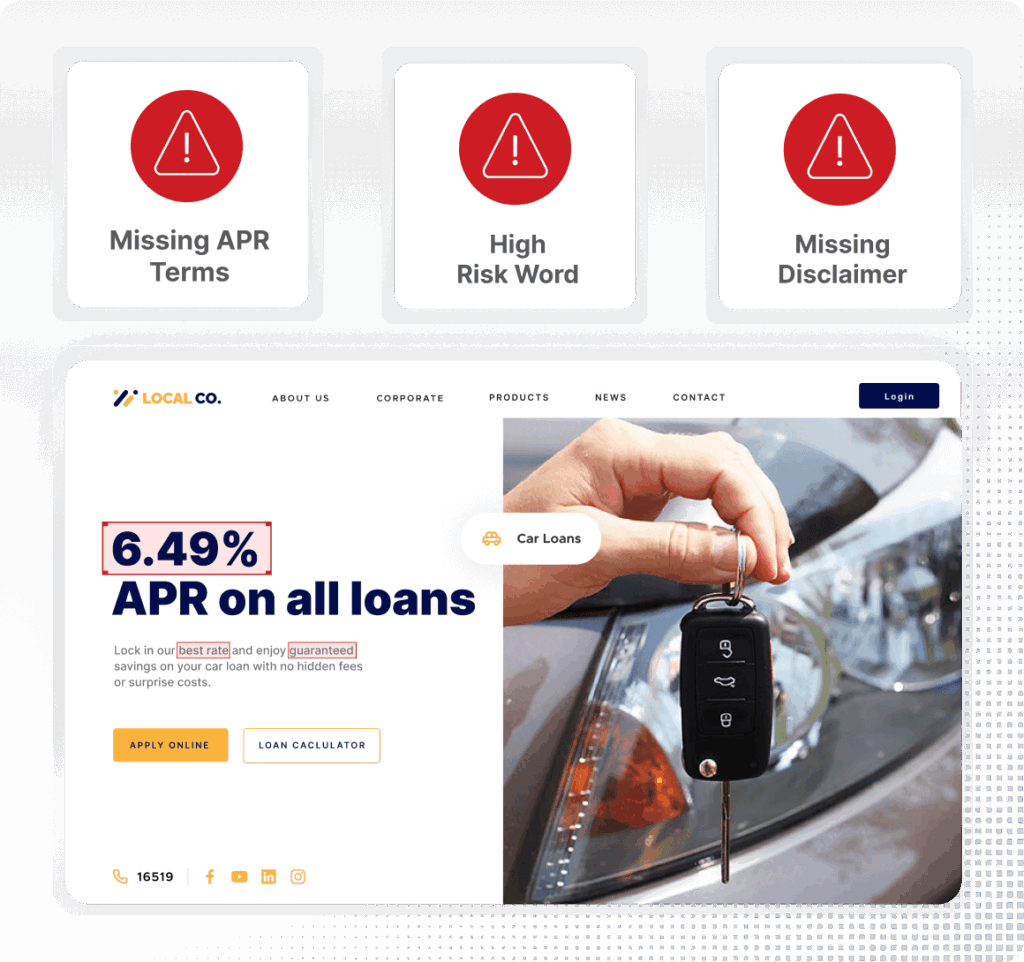
How Different Roles Benefit From Marketing Compliance
The benefits of Marketing Compliance software can be felt by many in many different ways:
For Chief Marketing Officers (CMOs):
- Accelerated Campaign Deployment: Automated compliance checks reduce delays in launching marketing initiatives.
- Enhanced Creativity: Clear compliance guidelines empower creative teams to innovate within legal boundaries.
- Reduced Frustration: Consistency on legal and compliance guidance ensures marketing can focus on marketing tasks and strategy, vs. debating with legal on what should be permitted.
For Chief Legal Officers (CLOs):
- Risk Mitigation: Proactive and automated identification of potential legal issues in marketing materials.
- Regulatory Alignment: Ensures marketing practices adhere to evolving legal standards.
- Pre-checks: Enables marketing teams and creatives to pre-check creative before it is sent to legal saving countless hours.
For Chief Compliance Officers (CCOs):
- Auto Risk Detection: Auto identification of potential compliance issues in marketing materials based on industry based regulations.
- Comprehensive Oversight: Centralized monitoring of marketing activities across all channels.
- Efficient Reporting: Simplified generation of compliance reports for internal and external stakeholders.
For Creative Teams (Designers/Copywriters):
- Real-Time Feedback: Instant compliance alerts during content creation minimize rework.
- Clear Guidelines: Defined rules reduce ambiguity and foster creativity within safe boundaries.
- Faster Iterations: Streamlined review cycles accelerate time-to-market.
For Executive Leadership (CEOs/CFOs):
- Cost Savings: Avoids fines and legal fees associated with non-compliance.
- Brand Protection: Safeguards reputation by preventing public compliance failures.
- Investor Confidence: Demonstrates robust governance and risk management.
Bottom Line: Compliance is a Competitive Advantage
Gone are the days of doing more with more. We can all do that. It takes a mix of creativity and number crunching to pull off more reviews, with more content and less resources. Platforms like IntelligenceBank have the ability transform compliance from a cost center into a profit-protecting powerhouse, delivering measurable ROI through cost avoidance, efficiency gains and revenue protection.
The case studies speak for themselves:
- Angle Auto Finance turned 400 years of manual work into scalable AI reviews.
- Tabcorp slashed approval times from 10 days to 20 minutes while eliminating errors.
- Golden Charter secured 800+ partner websites without hiring additional staff.
For leadership teams, the equation is clear – Compliance technology is an investment in growth, agility, and trust. In regulated industries, the brands that win will be those who automate compliance to move faster, safer, and smarter.
Ready to prove your ROI? Contact us for a deeper discussion.

